The Cape Coast and Elmina Castles stand as poignant reminders of the transatlantic slave trade‘s dark legacy. These UNESCO World Heritage sites evoke profound sorrow, inviting visitors to reflect on the immense suffering endured by millions of Africans forcefully taken from their homeland. The ominous "Door of No Return" marks the harrowing final passage for countless captives, severing their ties to identity and family. As these castles bear witness to humanity’s cruelty, they also inspire a commitment to social justice and historical awareness. Exploring their history and architecture offers a transformative experience, one that challenges us to confront the past and its lasting impact.
Key Points

- Cape Coast and Elmina Castles were central to the transatlantic slave trade, serving as holding cells for enslaved Africans before their voyage.
- The "Door of No Return" marked the final passage for captives onto slave ships, symbolizing the shattering of hope and the severing of ties to their homeland.
- These UNESCO World Heritage sites evoke profound sorrow and grief, serving as reminders of humanity’s cruelty and the strength of those who endured.
- Guided tours offer an opportunity to explore the complex history of oppression and resilience reflected in the architectural features of the castles.
- Visiting the castles can inspire transformative insights, fostering awareness of historical injustices and a commitment to social justice and positive change.
Historical Significance

During the colonial era, the Cape Coast and Elmina Castles played a pivotal role in the transatlantic slave trade.
Built by the Portuguese and later occupied by the Dutch and British, these fortresses served as holding cells for enslaved Africans before their forced voyage across the Atlantic.
The "Door of No Return" at both castles was the final passage through which captives were marched onto slave ships, never to see their homelands again.
Today, these UNESCO World Heritage sites stand as somber reminders of the immense human suffering that occurred here, providing visitors with a glimpse into a devastating chapter of history.
You can also read our reviews of more tours and experiences in Accra.
Architectural Highlights
The Cape Coast and Elmina Castles boast impressive architectural features that reflect their storied past. The castles’ imposing stone walls, towering bastions, and meticulously crafted interiors showcase the skill and vision of their builders. A notable architectural highlight is the castle windows, strategically placed to provide defense and ventilation.
| Architectural Highlights | |
|---|---|
| Fortified Stone Walls | Intimidating Bastions |
| Ornate Interiors | Strategically Placed Windows |
These architectural marvels stand as a testament to the region’s complex history, serving as both instruments of oppression and symbols of resilience.
Guided Tour Experience
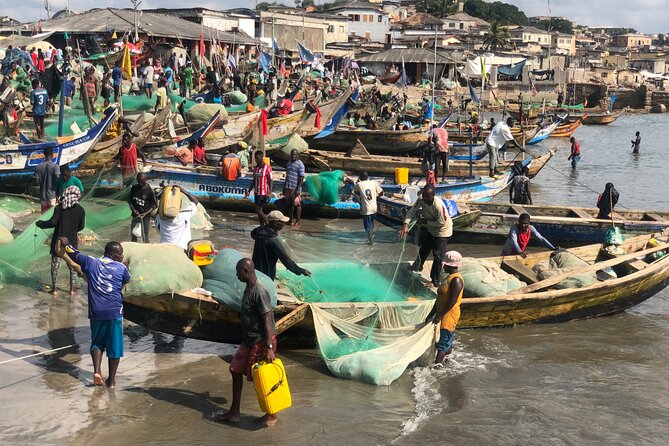
Embarking on the guided tour, visitors enjoy the captivating history of the Cape Coast and Elmina Castles.
The tour starts promptly at 6 AM, allowing guests to beat the crowds and explore these UNESCO World Heritage sites in relative serenity. Accompanied by a professional, friendly guide, visitors learn about the castles’ architecture, the slave trade that once thrived within their walls, and the powerful symbolism of the "Door of No Return."
The air-conditioned transportation, complimentary breakfast and lunch, and seamless organization make the experience both informative and comfortable.
With a 5.0 rating and glowing reviews, this tour offers an unparalleled opportunity to explore Ghana’s complex history.
Emotional Resonance
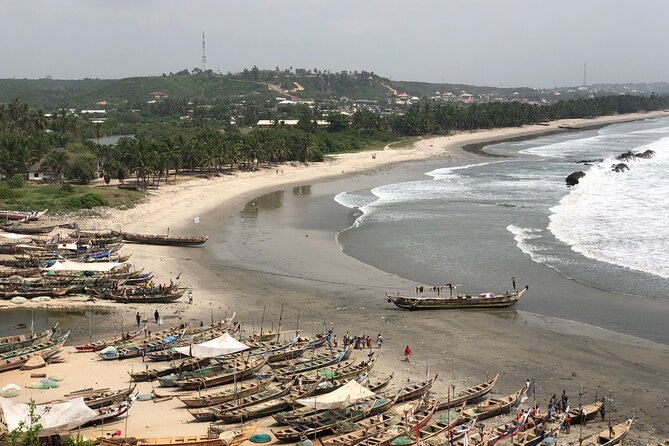
Stepping into the castles’ halls, visitors find themselves overwhelmed by the weight of history. The somber atmosphere evokes a profound sense of sorrow, as the stark remnants of a shameful past are palpable.
Echoes of the cries and anguish of the enslaved reverberate through the corridors, creating an emotional resonance that’s both visceral and humbling. Visitors often describe feelings of grief, guilt, and a deep resolve to confront the legacy of the transatlantic slave trade.
The castles serve as poignant reminders of humanity’s capacity for cruelty, as well as the resilience and strength of those who endured unspeakable hardships. The experience is both profoundly moving and a call to action, inspiring reflection and a renewed commitment to justice.
Door of No Return
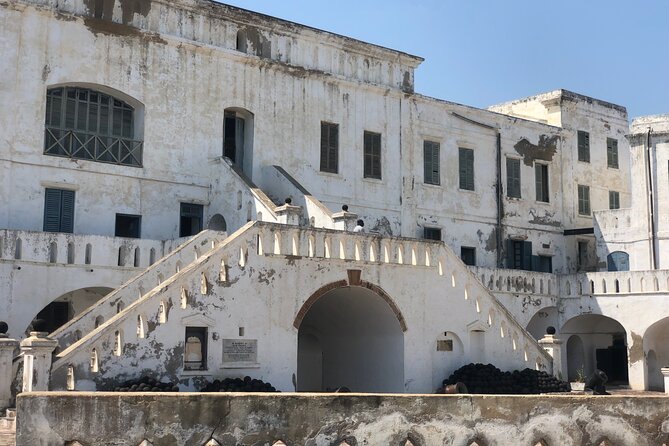
Through the ominous "Door of No Return", captives were forcibly marched into the holds of slave ships, their dreams of freedom and homecoming shattered.
This notorious portal, carved into the walls of the Cape Coast and Elmina Castles, served as the final passage for millions of Africans who were torn from their homes and families.
The harrowing journey that awaited them on the other side was one of dehumanization, suffering, and despair.
The Door symbolized:
- The crushing of hope
- The loss of identity
- The severing of ties to one’s homeland
- The beginning of a life in bondage
- Know Ghana in 4 Hrs – Accra City Tour
- The Homecoming Experience To Cape-coast And Elmina.
- Escape Accra City to Aburi Gardens and Tetteh Quarshie Cocoa Farms
- Experience Boti Waterfalls, Aburi Botanical Gardens & Tetteh Quarshie Cocoa Farm
- Ghana City 2-day Tour
- The Ancestral Naming Ceremony and Home Coming Experience
Visiting Logistics
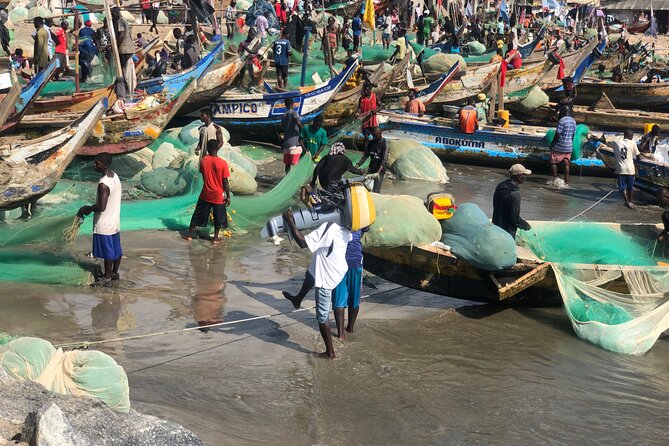
Visitors often commence their tour of the Cape Coast and Elmina Castles at 6:00 am, embarking on a journey through Ghana’s rich history. The tour, priced from €145.25 per person, includes an air-conditioned vehicle, fuel, all taxes, a professional driver, and a friendly, trained guide. Breakfast and lunch are also provided. Participants can choose to meet at the designated point on Independence Avenue in Accra or request pickup. The tour is accessible, with wheelchair and stroller options, infant seating, and public transportation nearby. Confirmation is received upon booking, and cancellations are free up to 24 hours before the experience.
| Meeting Point | Pickup Options | End Point | Accessibility |
|---|---|---|---|
| Independence Avenue, Accra | Directly to meeting point or request pickup | Returns to meeting point | Wheelchair accessible, Stroller accessible, Near public transportation, Infant seating available |
Local Culture Immersion
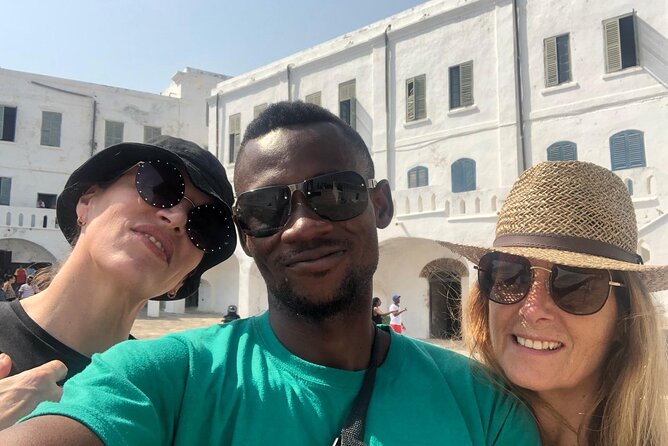
The Cape Coast and Elmina Castles offer an immersive cultural experience, allowing visitors to explore Ghana’s captivating history.
During the tour, guests can expect to:
-
Engage with local artisans and learn about traditional craftsmanship, such as wood carving and kente weaving.
-
Visit a historic village and observe the daily life and customs of the Ghanaian people.
-
Participate in a traditional drumming and dance performance, experiencing the vibrant rhythms and movements that are integral to Ghanaian culture.
-
Explore the bustling local markets, where a diverse array of goods, from vibrant fabrics to fragrant spices, can be discovered.
Transformative Insights

Oftentimes, the Cape Coast and Elmina Castles evoke profound emotional responses and transformative insights for visitors.
The dark history of the trans-Atlantic slave trade, which the castles represent, prompts deep reflection on the impacts of colonialism and the enduring legacy of systemic racism.
Visitors may confront their own biases and gain a deeper understanding of the struggle for human rights and dignity.
The experience can inspire a renewed commitment to social justice and motivate visitors to become agents of positive change.
These historic sites serve as powerful reminders of the resilience of the human spirit in the face of unimaginable oppression.
Frequently Asked Questions
Can We Take Photographs Inside the Castles?
Visitors can take photographs inside the castles, but they must obtain permission from the tour guide and follow any rules or restrictions in place. Photography may be limited or prohibited in certain areas for preservation purposes.
Is There a Dress Code for Visiting the Sites?
There is no strict dress code, but visitors are encouraged to wear comfortable, modest clothing out of respect for the historic sites. Loose, breathable fabrics are recommended for the warm climate.
Are There Any Health or Safety Risks to Be Aware Of?
There are no major health or safety risks, but visitors should wear comfortable walking shoes, bring water, and avoid strenuous activity in the heat. Guides provide information on precautions to take during the tour.
Can We Bring Our Own Food and Drinks?
According to the tour overview, guests can’t bring their own food or drinks. The tour includes breakfast and lunch, so visitors don’t need to provide their own meals. The tour provides all necessary sustenance.
Are There Any Additional Fees or Costs During the Tour?
The tour package includes all fees and costs, such as air-conditioned vehicle, fuel, taxes, professional driver, and meal provisions. There are no additional fees or costs during the tour experience.
Recap
The Cape Coast and Elmina Castles stand as poignant reminders of the transatlantic slave trade‘s immense suffering. The "Door of No Return" marks the harrowing final passage for countless captives. As UNESCO World Heritage sites, these castles evoke deep sorrow and reflection, inspiring a commitment to social justice and historical awareness. Visitors can engage with the local culture and gain transformative insights into humanity’s resilience in the face of oppression.
More Tour Reviews in Accra
- Aburi Gardens and Tetteh Quarshie Farms
- A Taste of West Africa – Ghana Togo & Benin
- Ghana Eastern Explorer – Boti Falls, Aburi Gardens & Tetther Quarshie Cocoa Farm
- Cape Coast Castle, Assin Manso Slave River and Door of No Return
- Cape Coast Castle and Kakum National Park 2-Day Private Tour
- 10 Day Ghana Adventure and Culture Tour
Not for you? Here's more things to do in Accra we have recnetly reviewed
- 3 Best Guided Tours In Accra
- 4 Best Shopping Tours In Accra
- 2 Best 2 Day Tours In Accra
- Elmina Slave Dungeon & Kakum Rainforest Day Trip
- Elmina & Cape Coast Castles Day Trip From Accra
- Boti Falls & Aburi Botanical Gardens Experience
- Introducing Ghana, 6 Days
- Cape Coast /Elmina Castles and the Door Of No Return
- Accra City Tour
- Half-Day Private African Drumming Lessons With Pick up
- Discover Ghana – Wli Waterfalls, Mountain Afadjato, Monkey Sanctuary & Akosombo.
- A 9 Days Experience Of The Motherland
